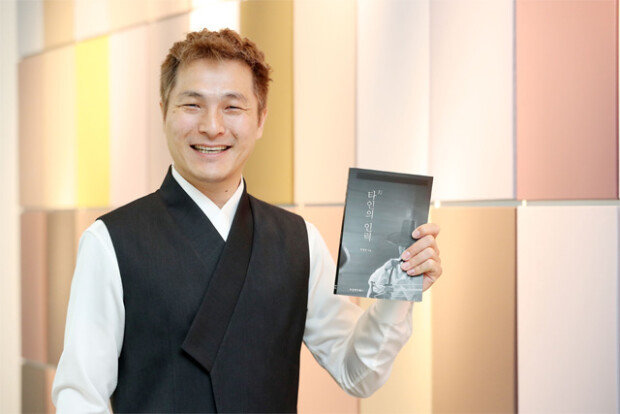Korean traditional musician Choi Yeong-jin publishes autobiography
Korean traditional musician Choi Yeong-jin publishes autobiography
Posted May. 01, 2020 08:10,
Updated May. 01, 2020 08:10

Korean traditional musician Choi Yeong-jin has published his first essay, “The Manpower of Others.” In a conservative industry with a rather rigid hierarchy, Choi released a book that is much like an autobiography in his early 40s. “The unwritten rule in the Korean traditional music sector is that you never publish a book or release an album before your teachers do, but I wanted to share my story,” said the author.
In the industry, Choi is known as everyone’s friend who has temperaments like a rhino and a bulldozer. He is music director of the global music group “Easternox” and art director of Hanbae Art Cultures. He has also completed “Bongsan Mask Dance” and “Gimje Nongak,” which are intangible cultural heritage.
Upon graduating Yeosu Technical High School in South Jeolla Province, he studied Korean traditional music at Seoul Institute of the Arts. It all began when he started playing with the janggu he had at home when he was an elementary student. His new book is filled with stories about how he learned music from masters. There is also an amusing story where he made a mistake performing in front of the president when he was in the military band.
Choi opened a YouTube channel called “Run, Mr. Choi” three years ago. His early videos show him running around with a selfie stick and playing “Pokemon Go.” “I wanted to promote Korean traditional music among young people,” said the author. The channel has now been turned into an archive of his performances. It is a 10-year project that began in 2008 dubbed “Choi Yeong-jin’s rhythms.” It is a monthly concert that takes place on the last Monday of each month at the Jeonghyo Art Center in Seoul’s Seocho district. The aim is to share the process of playing every kind of Sanjo melodies just as a hero overcomes challenges one by one in movies.
“I would like to recommend my book to someone who is starting to learn Korean traditional music or has lost passion after 10 years of learning it,” said the author. “Music can exist outside stage as well.”
imi@donga.com
Headline News
- N. Korea launches cyberattacks on S. Korea's defense companies
- Major university hospital professors consider a day off each week
- Italy suffers from fiscal deficits from ‘Super Bonus’ scheme
- Inter Milan secures 20th Serie A title, surpassing AC Milan
- Ruling and opposition prioritize spending amid tax revenue shortfalls






